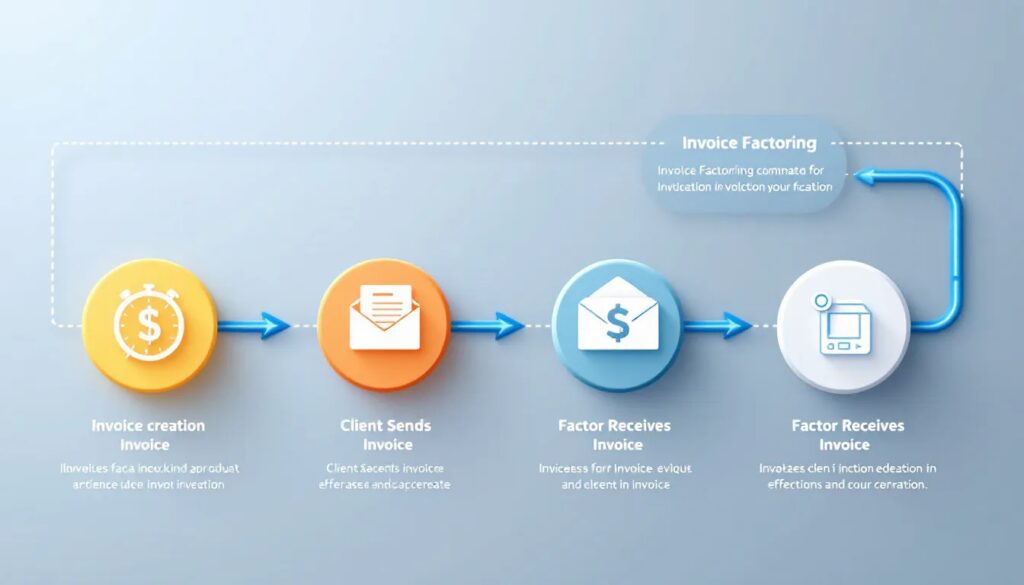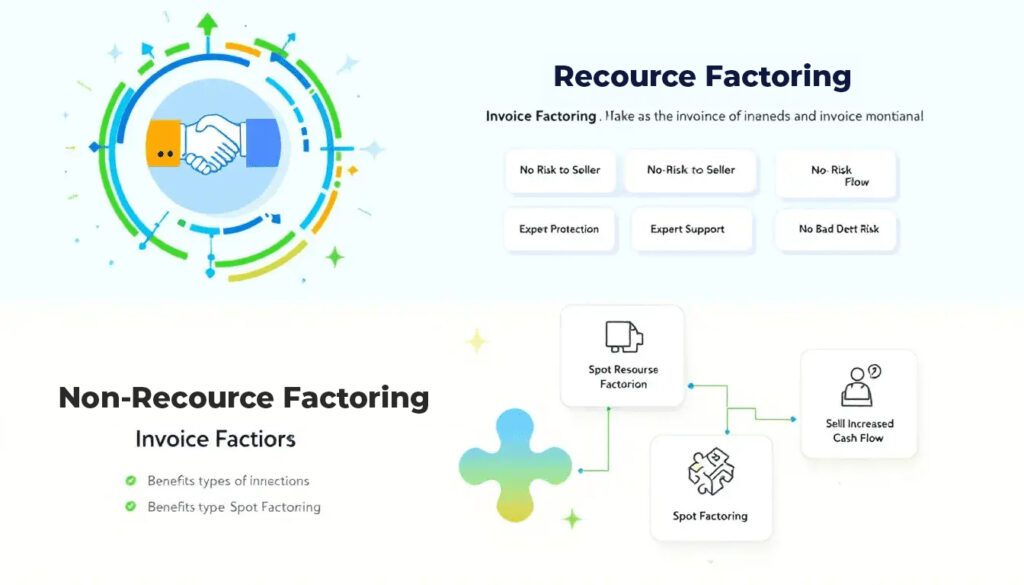What is a Factor in Business Financing?
Invoice factoring, or invoice factor, is a financial strategy where businesses sell their unpaid invoices to a factoring company for immediate cash. This helps improve cash flow and provides fast access to funds, which is crucial for businesses dealing with slow-paying clients or requiring quick capital. In this guide, we’ll break down what invoice factoring entails, compare it to traditional loans, and outline key considerations before using it.
Key Takeaways
- Invoice factoring, a form of invoice financing, allows businesses to sell unpaid invoices for immediate cash to a factor or factoring company, improving cash flow management without collateral.
- There are different types of invoice factoring, including recourse and non-recourse factoring, which impact liability for unpaid invoices and associated costs.
- Businesses must evaluate the reputation and contract terms of factoring companies to avoid hidden fees and ensure a beneficial partnership.
What is an Invoice Factor?

Invoice factoring is a financial transaction where businesses sell their unpaid invoices to a factoring company for immediate cash. This practice allows companies to manage cash flow more effectively by converting outstanding invoices into working capital, enabling them to meet short-term expenses without waiting for customer payments. This strategy particularly benefits businesses experiencing slow customer payments or those needing quick cash to sustain operations.
Invoice factoring primarily aims to improve cash flow, enhance working capital, and help businesses meet financial obligations. Selling unpaid invoices to a factoring company helps avoid delays tied to traditional payment terms, maintaining financial stability.
How Invoice Factoring Differs from Traditional Loans
Unlike traditional loans, invoice factoring does not require businesses to provide collateral, as it involves selling invoices rather than borrowing against assets. This makes invoice factoring an attractive option for small businesses that may not have significant assets to offer as security. Additionally, the financial assessment in invoice factoring focuses on the credit risk of the customers rather than the borrowing business itself, making it easier for businesses with less-than-perfect credit to qualify.
The speed of fund access is another key difference. Traditional loans often involve lengthy approval processes, but invoice factoring provides immediate cash, enabling businesses to promptly manage daily expenses and cover operational costs. This quick access to funds is a primary reason many businesses prefer invoice factoring over traditional bank loans.
The Invoice Factoring Process

In the invoice factoring process, businesses sell unpaid invoices to a factoring company for immediate cash, improving cash flow. This transaction allows businesses to access funds without lengthy loan approval processes by selling invoices at a discount for cash advances.
After deciding to use invoice factoring, businesses submit customer invoices to a factoring company post-delivery of a product or service. The process includes two payments: an upfront payment and a second payment upon invoice collection. A factoring company collects payment from the customer, and factoring companies generally advance 80% to 100% of the invoice value.
Steps Involved in Invoice Factoring
The first step in invoice factoring involves choosing a factor company that reviews the business’s credit and invoices before approval. Once selected, businesses send invoices for verification. Funds can be received as quickly as the next business day after verification.
The entire process, from selecting a factoring company to receiving funds, can take about a week. This efficiency allows businesses to quickly convert their receivables into cash, addressing immediate financial needs and stabilizing cash flow.
Types of Invoice Factoring

A visual comparison of different types of invoice factoring
Invoice factoring comes in various forms, including:
- Recourse factoring
- Non-recourse factoring
- Spot factoring
- Whole ledger factoring
Understanding these types is crucial for businesses seeking to enhance cash flow through this financial transaction.
There are two primary types of invoice factoring. These are recourse factoring and non-recourse factoring. Recourse factoring means the company is liable if invoices are unpaid, whereas non-recourse factoring means the factor bears the liability.
Additionally, businesses can choose between spot factoring, which involves selling a single invoice, and whole ledger factoring, which involves factoring all outstanding invoices for a comprehensive cash flow solution.
Recourse vs. Non-Recourse Factoring
In recourse factoring, the business remains responsible for unpaid invoices, meaning if a customer fails to pay, the company may need to reimburse the factor. This type of factoring often involves lower costs due to the reduced risk for the factoring company. However, it also means the business retains the credit risk.
Non-recourse factoring, on the other hand, allows businesses to avoid liability for unpaid invoices after selling them to a factoring company. The factor assumes responsibility for any losses, providing bad debt protection. While this peace of mind comes with higher factoring fees, it can be a valuable option for businesses looking to mitigate risk.
Spot Factoring vs. Whole Ledger Factoring
Spot factoring involves selling a single invoice to a factoring company, providing immediate funding for one large outstanding invoice. This option is beneficial for businesses needing quick cash for a specific financial obligation. However, spot factoring typically involves higher fees than conventional factoring.
Whole ledger factoring, in contrast, involves selling all outstanding invoices for a more comprehensive cash flow solution. This method can provide steady cash flow but may not be ideal for companies with customers who pay promptly.
Businesses must weigh their needs and customer payment behaviors when choosing between these two options.
Costs Associated with Invoice Factoring
Understanding the costs associated with invoice factoring is crucial for businesses considering this financial tool. Invoice factoring cost typically includes factoring fees, which usually fall between 1% and 5%. This percentage is based on the value of the invoice. These costs generally include a discount fee and a service fee, with the discount fee ranging from 1.5% to 5% and service fees from 0.5% to 2.5% of the invoice value, including a factoring fee.
Factors influencing the cost of invoice factoring include the invoice amount, transaction volume, customer creditworthiness, and whether the agreement is recourse or non-recourse. Recourse factoring typically has lower fees compared to non-recourse factoring due to the associated risks.
Please read understanding factoring costs.
Common Factor Fee Structures
A common fee structure in invoice factoring is a tiered structure that varies based on the volume of invoices processed. Discount rates in factoring agreements typically range from 1% to 6%, and they may decrease with a higher number of invoices. Service fees are negotiated as a percentage of the invoice amount and depend on the due date.
Advance rates in invoice factoring generally range from 70% to 95% of the invoice value, with larger invoices typically having more favorable rates. Understanding these fee structures can help businesses better plan and manage their cash flow.
Hidden Fees to Watch Out For
Potential hidden costs in factoring agreements may include setup fees, late payment fees, and contract termination fees. Some agreements may also have service fees and monthly minimum fees that businesses should consider.
A transparent fee structure from your factoring partner is crucial to avoid unexpected costs. Thoroughly reviewing factoring agreements and understanding the full scope of fees and expenses involved can protect businesses from financial surprises.
Benefits of Invoice Factoring

The primary benefit of invoice factoring is the immediate access to cash, allowing businesses to manage daily expenses without waiting for customer payments. This immediate cash flow can support better business operations and enhance overall financial stability.
Invoice factoring also improves cash flow management by converting outstanding invoices into immediate working capital through an invoice factoring company. This reduces the days sales outstanding and enables businesses to receive payments more rapidly, improving revenue stability and operational funding. When considering invoice factoring vs traditional loans, many companies find the former to be more advantageous.
Immediate Access to Cash
Invoice factoring allows businesses to sell their unpaid invoices, enabling quick access to cash. Typically, businesses can receive funds within 2 or 3 days, and some factoring companies can provide funds as soon as the next business day after approval. This immediate cash can be used to cover expenses or fuel growth.
Invoice factoring aids seasonal businesses in managing payroll and expenses during off-peak periods, offering a financial cushion when revenues are low.
Improved Cash Flow Management
Invoice factoring improves cash flow by converting accounts receivables into cash, allowing businesses to maintain smoother cash flow even with longer payment terms offered to clients. This stability is especially beneficial for businesses with seasonal demand, as it helps manage financial unpredictability by providing quick access to funds as needed through accounts receivable financing.
By leveraging unpaid invoices, businesses can ensure they have the liquidity needed to cover short-term liabilities and seize growth opportunities, ultimately improving their financial health through unpaid invoices.
Risks and Challenges of Invoice Factoring

While invoice factoring offers numerous benefits, it also comes with risks. One significant concern is the risk of non-payment by customers, which can lead to increased factoring fees if invoices remain unpaid for longer periods. Additionally, the involvement of a third-party factoring company can affect customer relationships and long-term cost implications.
Non-recourse factoring presents a lower risk for the business compared to recourse factoring, as the factoring company assumes the credit risk.
Impact on Customer Relationships
Choosing invoice factoring can impact customer relationships due to third-party involvement. Handling invoices by a third party may introduce more demanding communication styles, potentially straining existing relationships.
However, when managed professionally, invoice factoring can strengthen client relationships rather than damage them. It is essential for businesses to choose a reputable factoring company that values customer rapport and handles collections with professionalism and respect.
Long-Term Cost Implications
Recourse factoring can create cash flow problems and lead to a debt spiral over time, as the business remains liable for unpaid invoices, potentially accumulating financial strain if customers fail to pay.
Invoice factoring can impact long-term financial stability by transforming cash flow management practices. Businesses must carefully consider the long-term cost implications and choose the type of factoring and partner that aligns with their financial goals and risk tolerance.
Choosing the Right Factor Company
Selecting the right factoring company is crucial to maximizing the benefits of invoice factoring. One of the first steps is to evaluate the company’s reputation and experience. Businesses should look for firms with a proven track record, positive online reviews, and affiliations with reputable industry organizations like the International Factoring Association. Considering how long the factoring company has been in operation can also indicate stability and reliability.
Understanding contract terms is equally important. Businesses should thoroughly review the terms and conditions of factoring agreements to avoid future disputes and financial surprises. This includes checking for any fees, advance rates, and the flexibility of the contract length. By doing so, businesses can ensure they are partnering with a factoring company that aligns with their financial needs and goals.
Evaluating Reputation and Experience
Start by researching online reviews and the age and reputation of factoring companies. Affiliations with the International Factoring Association can add credibility. Also, consider the company’s longevity in the market as a measure of reliability.
Customer case studies and BBB ratings can provide further insights into the company’s performance and customer satisfaction. Evaluating these aspects helps businesses make informed decisions and select a factoring partner to impact their cash flow management positively.
Understanding Contract Terms
Invoices factoring contracts often allow for renegotiation of fees, advance rates, and contract length. It’s essential to regularly review your factoring agreement for any changes in business conditions that may affect the terms. When considering non-recourse factoring, review the contract for any criteria or loopholes that could convert it into recourse factoring.
Checking the fees outlined in the factoring contract is vital to avoid unexpected costs later. Thoroughly understanding the terms and conditions of factoring agreements is crucial to avoid future disputes and financial surprises. This diligence ensures that businesses can fully leverage the benefits of invoice factoring.
Industries That Benefit Most from Invoice Factoring
Specific industries particularly benefit from the advantages of invoice factoring. For example, the transportation, staffing, and manufacturing sectors frequently utilize this financial tool to improve cash flow. Invoice factoring helps these industries manage cash flow fluctuations and meet operational expenses by converting unpaid invoices into immediate working capital.
Business-to-business (B2B) companies, especially those dealing with slow-paying customers, find invoice factoring beneficial. It’s an essential tool for businesses needing fast access to capital to maintain financial stability and support growth initiatives. Many turn to invoice factoring companies for this purpose.
Small Businesses and Startups
Due to delayed customer payments, small businesses and startups often face cash flow challenges. Invoice factoring provides immediate capital, allowing for efficient cash flow management and avoiding delays tied to customer payments. This financial tool is particularly beneficial for startups looking to quickly address cash flow issues and support their growth initiatives.
Effective management of cash flow is crucial for the sustainability and growth of small businesses and startups. By leveraging invoice factoring, these businesses can ensure they have the liquidity needed to cover operational expenses and invest in growth opportunities.
Seasonal Businesses
Seasonal businesses often experience fluctuations in revenue, making cash flow management a significant challenge. Invoice factoring helps stabilize cash flow by providing funds during off-peak seasons, ensuring that operations continue smoothly during periods of low revenue.
Many businesses face cash flow management challenges due to seasonal revenue fluctuations. Invoice factoring can help bridge the gaps between payments, providing the financial stability to weather these fluctuations.
Real-World Example of Invoice Factoring
To illustrate how invoice factoring works in real-world scenarios, let’s consider a landscaping business that factors a $2,000 invoice. The business receives $1,600 immediately after subtracting the factor’s fee, providing the necessary cash flow to manage operational expenses.
Another example involves a company that factors $100,000 in invoices at a 5% rate, receiving $95,000 in immediate cash. These examples demonstrate how invoice factoring can provide businesses with quick access to funds, improving their cash flow and operational stability.
Key Considerations Before Using Invoice Factoring
Before opting for invoice factoring, businesses need to consider several factors. When facing negative cash flow and having many unpaid invoices, invoice factoring can be a viable solution to gain control over cash flow and simplify accounts receivable management. It’s vital to assess how and when your customers typically make payments to determine the feasibility of factoring.
Long contracts with factoring companies may limit a business’s ability to adjust to changing customer relationships. Additionally, startup founders might have concerns regarding control over aged receivables and factoring rates.
Considering alternative financial options besides invoice factoring can also be beneficial for comprehensive cash flow support.
Please read invoice factoring case studies.
Summary
Invoice factoring offers businesses a powerful tool to manage cash flow effectively by converting unpaid invoices into immediate working capital. The benefits of improved cash flow, immediate access to funds, and reduced debt make it an attractive option for many businesses. However, understanding the costs, risks, and choosing the right factoring partner are crucial steps to maximize these benefits.
In conclusion, invoice factoring can be a game-changer for businesses, providing the financial stability needed to grow and thrive. By carefully evaluating the terms, costs, and risks, businesses can leverage this financial tool to its fullest potential, ensuring sustained operational success.
Frequently Asked Questions
What is factor invoicing?
Factor invoicing is the process of selling outstanding invoices to a third party, known as a factoring company, to receive immediate cash. This provides businesses with quick access to capital while outsourcing the collection of their receivables.
Is invoice factoring legal?
Yes, invoice factoring is legal and serves as a common method for businesses to enhance their cash flow by selling unpaid invoices. Ensure to engage with a reputable factoring company and review contract terms for compliance and protection. Factoring an invoice means selling it to Bankers Factoring.
What is an example of invoice factoring?
An example of invoice factoring is when your business issues a $10,000 invoice to a client and sells it to a factoring company for an advance of $8500, allowing you to access cash immediately while the factor collects the payment. This process enables improved cash flow by converting outstanding invoices into liquid capital. After your customer pays, the factoring company sends you the remaining $1500 reserve minus the factor fee.
What is a factor invoice?
A factored invoice represents outstanding invoices sold to a factoring company for immediate cash, providing a financing option that does not affect your credit. This method allows businesses to maintain liquidity without resorting to traditional loans.
What is the primary benefit of invoice factoring?
The primary benefit of invoice factoring is its immediate working capital, which enhances cash flow and reduces the burden of managing accounts receivable. Factoring provides permanent working capital.
